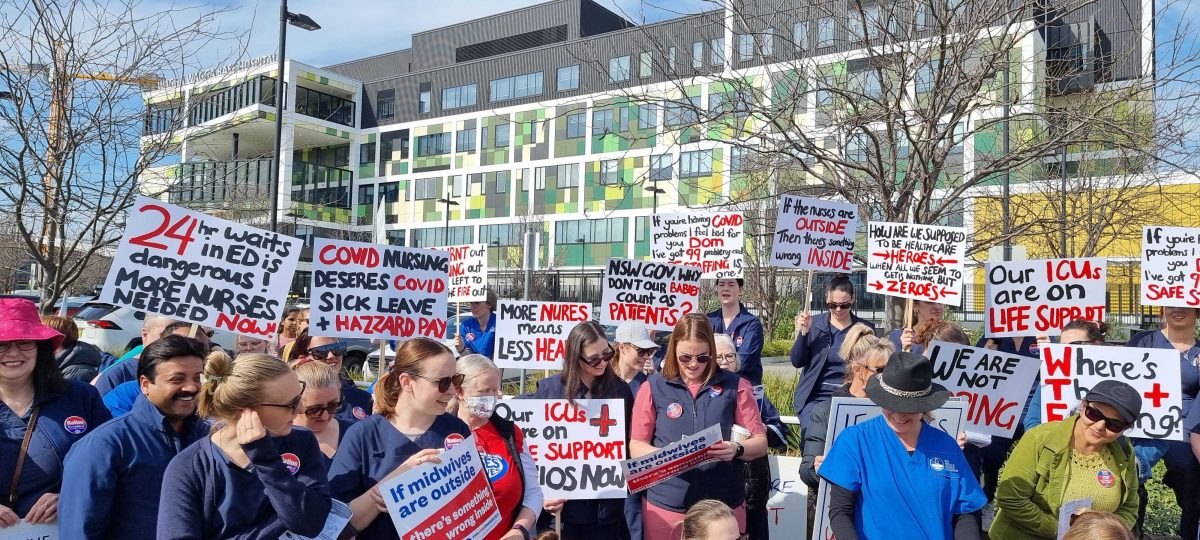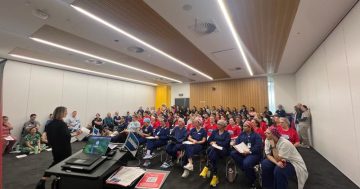
Nurses and midwives in Victoria and others states are pushing for better wages and conditions. Photo: Shri Gayathirie Rajen.
After unanimously rejecting the Victorian Government’s wages and conditions offer, almost 100,000 members of the Australian Nursing and Midwifery Federations’ (ANMF) state branch have collectively applied in the Fair Work Commission for a protected industrial action ballot.
Negotiations began in late October between the ANMF’s Victorian branch and the employers’ representative, the Victorian Hospitals’ Industrial Association, which is overseen by the Department of Health.
Since then, there have been 23 full-day meetings where members have expressed their desire for a range of claims designed to retain, recruit and rebuild their early career and experienced nurses and midwives workforce.
Over the past five years, figures from the Nursing and Midwifery Board of Australia show a net growth in registration of more than 16,000 Victorian nurses.
The union representing nurses, midwives and aged care personal workers alleges that while the workforce has increased, filling rosters remains challenging because employees are reducing their hours and moving from permanent to casual employment.
ANMF’s Victorian Branch applied for the ballot following a statewide meeting on 21 March that heard a progress report on enterprise agreement negotiations (EBA). It’s currently negotiating with government on the national stage for its 2024-2028 public sector nurses and midwives enterprise agreement, as the current one expires on 30 April.
While they were supportive of progress on non-cost EBA items, the over 1500 members in attendance directed their union to continue negotiations over the lack of any cost claims that are designed to address the systemic and increasing casualisation of its workforce.
Victorian Branch Secretary Lisa Fitzpatrick said the Allan Government’s wages policy would fail the Victorian health system and community because it doesn’t reverse the expensive and increasing casualisation of the state’s nursing and midwifery workforce.
“Our nursing and midwifery workforce is at a critical juncture and it’s not unlike the situation at the end of the 1990s caused by the Kennett Government making nurses redundant,” said Ms Fitzpatrick.
“Today, work intensification and unpopular employer rostering practices such as redeployment and constant management requests to work additional shifts and overtime mean nurses and midwives are moving from permanent to casual so they can control their hours.
“Nurses and midwives are asking their employers to listen to them, to acknowledge what’s happened over the last five years of COVID and to implement cost-effective initiatives that will retain and recruit early career and experienced staff and rebuild the permanent workforce.”
The State Government’s rejected offer was an annual three per cent wage increase over four years, plus a cash payment of around $1500 per full-time staff and pro-rata for part-time.
However the ANMF’s claim does not specify a percentage wage increase, rather it asks that wages and allowances recognise the government’s wages policy.
On top of this, the union seeks to address issues such as gender equity, cost of living, retention, increasing permanent employment, interstate/territory competitiveness and several other considerations.
Around 30 per cent of a nurse or midwife’s take-home pay comprises allowances above the base rate. The union is claiming about 15 new or improved financial incentives to reward working additional permanent hours and unpopular shifts.
ANMF is also seeking the introduction of financial disincentives for unpopular employer rostering practices, like redeployment, excessive reliance on overtime and missed meal breaks.
Ms Fitzpatrick said nurses and midwives only ever take industrial action as a last resort to protect the profession, the health system and patient care.
“The stakes are high, and they know the outcome of this EBA must stop casualisation and deliver a permanent and sustainable workforce,” said Ms Fitzpatrick.











